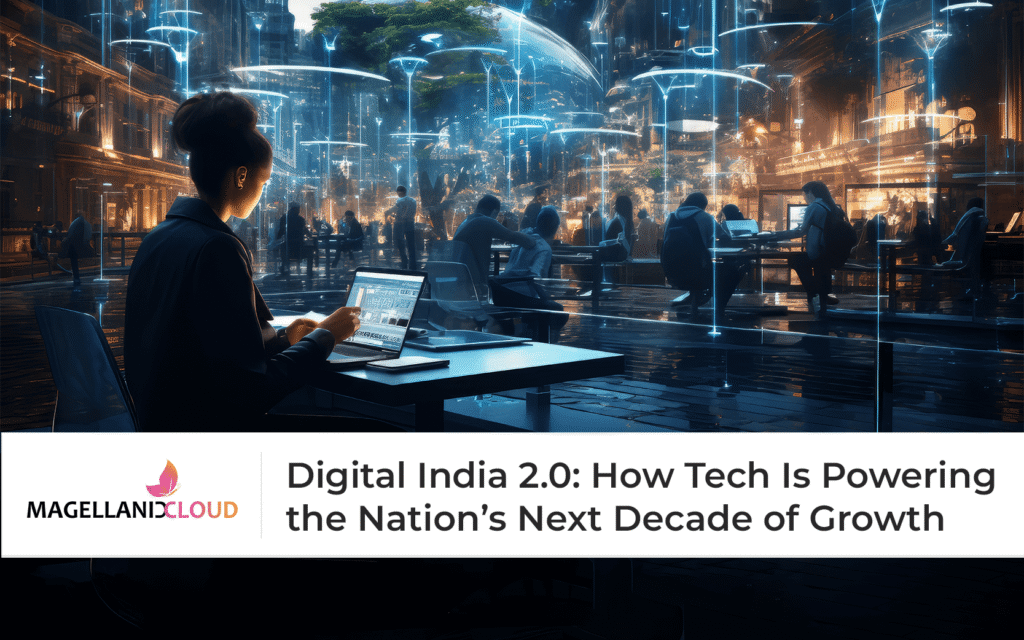Digital India 2.0: How Tech Is Powering the Nation’s Next Decade of Growth

On a warm evening in Varanasi, a shopkeeper waves his smartphone over a QR code and receives instant payment from a pilgrim’s UPI app. Just a few kilometers away, a rural health worker updates a villager’s health record digitally, syncing it in real time to the national database. A student, meanwhile, logs into an online class powered by BharatNet’s rural broadband connection.
This is the India of today, where digital public infrastructure has transformed the everyday lives of millions. Yet, this is only the beginning.
Over the last decade, India’s digital transformation, from Aadhaar IDs to UPI payments, has laid the groundwork for deeper change. Now the focus is on emerging technologies (AI, IoT, 5G, cloud, blockchain, etc.) that will take India’s economy and society to the next level. The government has boosted funding for this push: for example, the MeitY budget for Digital India jumped to about ₹21,829 crore in 2024–25 (up from ₹16,434 crore the year before). IBEF notes that “Digital India is on the path to transformative growth” powered by AI, blockchain and 5G, with initiatives like BharatNet and Digital India 2.0 explicitly “set up to bridge the gap between infrastructure and connectivity.
With Digital India 2.0, the government envisions a smarter, safer, and more connected nation, one that positions technology as the backbone of growth for the next decade.
India’s Digital Leap So Far
When the Digital India Mission launched in 2015, the focus was on providing connectivity, digital services, and empowerment. The results speak volumes:
- India now leads the world in digital payments, with UPI processing over 10 billion transactions a month in 2023 (NPCI data).
- Internet penetration stands at over 850 million users as of 2025, making India the second-largest online population globally .
- More than 1.3 billion Aadhaar IDs and the IndiaStack ecosystem have enabled scalable identity and financial inclusion like never before.
These achievements laid the foundation. Digital India 2.0 builds upon them, not just connecting people but reshaping the Indian tech economy to lead in AI, cybersecurity, quantum, and global innovation.
Infrastructure: Building the Digital Backbone
At the heart of India digital transformation lies infrastructure. Broadband highways, 5G rollout, and data centers are the highways of tomorrow’s economy. The government’s Digital India Act (expected 2025) aims to replace the two-decade-old IT Act, offering a modern framework for governance in areas such as AI, online safety, and digital markets.
India’s data center capacity is expected to double by 2026, reaching 1,400 MW of IT load. With BharatNet aiming to connect every village panchayat with high-speed fiber, rural and urban India will finally converge into one digital workplace transformation.
This backbone is what makes Digital India 2.0 resilient: from banking to governance, every service relies on a secure, scalable cloud and high-speed digital highways.
Emerging Tech: The Engines of Digital India 2.0
While infrastructure builds the roads, emerging technologies drive vehicles. The IndiaAI Mission, backed by a ₹10,000 crore allocation in the Union Budget 2024–25, aims to make India a global hub for AI in India research and innovation.
Add to this:
- Blockchain pilots in land records and supply chains.
- Quantum computing initiatives under the National Quantum Mission (₹6,000 crore outlay).
- Cybersecurity frameworks to protect a population of a billion-plus digital citizens.
Together, these innovations are shaping an AI workplace transformation and powering the future of work. Here, India is not just catching up, it’s set up to lead.
Digital Services for Every Citizen
The essence of Digital India 2.0 lies in inclusivity. Programs such as:
- Ayushman Bharat Digital Mission – building unified digital health records.
- ONDC (Open Network for Digital Commerce) – democratizing e-commerce for small traders.
- DigiLocker – already used by over 200 million citizens to store official documents.
These services enhance employee experience, business efficiency, and governance outcomes. From metro cities to remote hamlets, India tech innovation ensures that services are accessible, reliable, and citizen-first.
Make in India: Local Innovation at Global Scale
India’s startups, over 1117 unicorns as of 2025, are no longer followers; they are global disruptors. The push for semiconductor labs, EV ecosystems, and AI-driven platforms ensures that the Indian tech economy thrives not just as a consumer, but also as a creator.
This aligns perfectly with Digital India 2.0’s goal: fostering indigenous India tech innovation that scales to global benchmarks, while addressing domestic challenges like agriculture, logistics, and healthcare.
Magellanic Cloud: A Partner in Digital India 2.0
At Magellanic Cloud, we see ourselves as part of this nation’s technology backbone. Through our vertical Motivity Labs, we drive digital workplace transformation with cutting-edge AI, intelligent automation, and enterprise applications.
Our capabilities align directly with Digital India 2.0 priorities:
- AI in management and decision-making to power smarter organizations.
- Cybersecurity solutions for trust and resilience. Cloud and IT services to scale India’s data-driven future.
- Digital transformation expertise enabling both enterprises and public systems to innovate faster.
Whether it’s AI workplace transformation for corporations or enhancing digital public infrastructure, Magellanic Cloud is committed to helping India achieve its vision of inclusive, sustainable digital growth.
Towards a Connected Future
So, what will the next decade look like?
Imagine an India where farmers use AI-driven platforms to predict yields, students in Ladakh collaborate with peers in Tokyo via 5G-enabled classrooms, and small businesses in rural Bihar trade globally through ONDC.
That’s the promise of Digital India 2.0, a nation powered by ethical AI, cloud resilience, and citizen-first services.
And as the journey unfolds, Magellanic Cloud will continue to stand at the crossroads of India digital transformation, ensuring that technology doesn’t just serve growth, but also bridges divides and empowers every citizen.
The digital revolution is no longer a dream. It is India’s next decade. And it has already begun.

